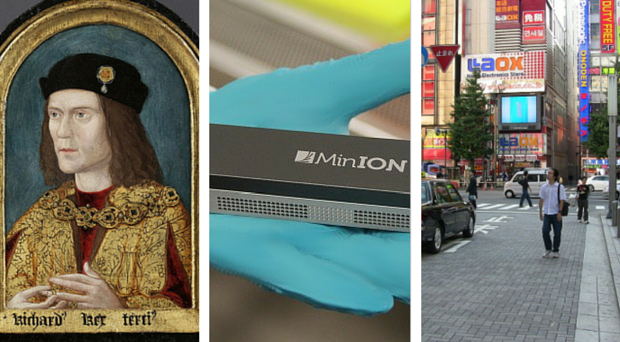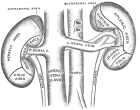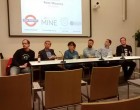
Richard III: ancient DNA solves a 500-year-old mystery
King Richard III of England was reburied on Thursday 26th March in Leicester Cathedral, after being discovered under a car park in the city in 2012. The discovery was only the start of a complex process involving genetics and the recovery of ancient DNA to prove the skeleton’s identity. I wrote about the discovery, and the science behind it.
Inappropriate manipulation of peer review
Following a thorough investigation, Elizabeth Moylan, our Senior Editor, Research Integrity, provided a further update on our discovery last year of attempts to manipulate the peer review process at several of our journals. You can also see our original statement and a previous update on this.
A firsthand perspective of trialing mobile DNA sequencing
Sam Minot from Signature Science, LLC and Andy Kilianski from the Edgewood Chemical Biological Center are part of a team that has been trialing a new palm-sized DNA sequencer to test whether it can characterize viruses and bacteria. Their findings, published in GigaScience, suggest the device could have potential for disease diagnosis in the field. They reported on them in this guest post for GigaBlog.
From science in crisis, to open access in Japan
 Is science broken? The reproducibility crisis: In an effort to respond to growing concerns about a ‘reproducibility crisis’ in science, University College London opened the discussion on the extent to which research practices are failing science and what we can do as a community to fix this. Liz Bal reported on the debate.
Is science broken? The reproducibility crisis: In an effort to respond to growing concerns about a ‘reproducibility crisis’ in science, University College London opened the discussion on the extent to which research practices are failing science and what we can do as a community to fix this. Liz Bal reported on the debate.
 A day in the life of a nephrologist: For World Kidney Day, we asked Evi Nagler, nephrologist and guideline specialist, to tell us about a typical day in the life of a nephrologist, how she was inspired to work in nephrology, and some of the challenges she faces.
A day in the life of a nephrologist: For World Kidney Day, we asked Evi Nagler, nephrologist and guideline specialist, to tell us about a typical day in the life of a nephrologist, how she was inspired to work in nephrology, and some of the challenges she faces.
 Women in science: A perspective from Peru: Dionicia Gamboa is a winner of the 2013 Elsevier Foundation Awards for Early Career Women Scientists in the Developing World. For International Women’s Day, we asked her to tell us about what inspired her to become a scientist, and her perspective on what life is now like for women in science.
Women in science: A perspective from Peru: Dionicia Gamboa is a winner of the 2013 Elsevier Foundation Awards for Early Career Women Scientists in the Developing World. For International Women’s Day, we asked her to tell us about what inspired her to become a scientist, and her perspective on what life is now like for women in science.

Open data – more obstacles or opportunities?: At the end of February, Digital Science organized their first Spotlight event, held at their offices in central London. The topic: ‘Open data for researchers – the obstacles and the opportunities’ attracted a varied crowd of scientists, journal editors and tech gurus who gathered to discuss what open data means practically for researchers and publishers. Maria Kowalczuk reported on the event.
 Rats are exonerated as reservoir hosts for the Black Death: It now seems that the black rat may have been wrongly accused of acting as a European reservoir for the plague bacteria and initiating sporadic disease outbreaks for 400 years. Hilary Hurd covered the story on BugBitten.
Rats are exonerated as reservoir hosts for the Black Death: It now seems that the black rat may have been wrongly accused of acting as a European reservoir for the plague bacteria and initiating sporadic disease outbreaks for 400 years. Hilary Hurd covered the story on BugBitten.

Visions of the future for academic publishing: March saw the 350th anniversary of the Royal Society’s Philosophical Transactions – the world’s first science journal – which is still published today. Much of our contemporary approach to publishing research began with the launch of that journal, but what does the future hold? We got views from colleagues across the publishing team.
 Open access in Japan – an inside perspective: At a time of increasing support for open access in Japan, Deborah Kahn spoke to Yuko Nagai of the Zoological Society of Japan about the society’s new open access journal and the future of open access in the country.
Open access in Japan – an inside perspective: At a time of increasing support for open access in Japan, Deborah Kahn spoke to Yuko Nagai of the Zoological Society of Japan about the society’s new open access journal and the future of open access in the country.
Comments